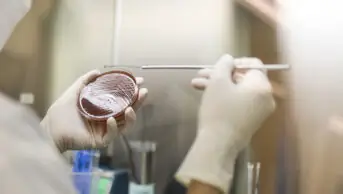
Shutterstock.com
An estimated 66,730 serious antibiotic-resistant infections were reported in 2023, surpassing pre-pandemic levels of 62,314 infections in 2019, a report published by the UK Health Security Agency (UKHSA) has said.
The ‘English surveillance of antibiotic prescribing and utilisation report‘ (ESPAUR), published on 14 November 2024, shows that in England, there has been an 3.5% increase in the burden of antimicrobial resistance (AMR), which is calculated by determining the rates of resistance to antibiotics in organisms selected for their public health importance.
Data in the report show that the majority of antibiotic-resistant bloodstream infections in the past five years were caused by Escherichia coli (65%) — a common cause of urinary tract infections, diarrhoea, vomiting and fever.
In addition, the report highlighted a widening gap between people living in the most and least deprived areas of England, with people living in more deprived communities 42.6% more likely to have an antibiotic-resistant infection, compared with those in the least deprived areas — up from 29.4% in 2019.
The rates of resistant infections in the most deprived populations of England have increased by 9.5% during this time.
The report noted that the highest burden of resistance was observed in London and north west England, along with the highest rates of resistant bacteraemia reported in the Asian or Asian British ethnic group (33.3 per 100,000 population or 39.4% resistant), almost double compared with white ethnic groups (29.5 per 100,000 population or 20.1% resistant).
There were also higher rates of antibiotic prescribing in 2023, increasing by 2.4% from the previous year, in line with figures in 2019. The increases were across the majority of antibiotic groups, with penicillin accounting for the most frequently prescribed group in primary and secondary care.
In May 2024, the government published the UK AMR five-year national action plan — ‘Confronting antimicrobial resistance 2024 to 2029‘. The document includes four main themes: reducing need for antimicrobials, optimising antimicrobial use, investing in innovation and being a good global partner — to reduce total antibiotic use in the UK population by 5% from the 2019 baseline.
Following this, in August 2024, NHS England announced that an expanded ‘subscription model’ for companies to provide antimicrobials to the NHS will be allocated an annual budget of £100m for contracts awarded during the 2024/2025 procurement process.
The model, first announced in 2019, incorporates a subscription-type fixed-fee contract value with a performance component, where payment is not linked with the volume of antimicrobials supplied, but rather on the supplier satisfying specified performance requirements, such as surety of supply, stewardship and surveillance.
Commenting on the report, Nicola Rose, interim executive director of science and research of the Medicines and Healthcare products Regulatory Agency, said: “Our scientists are working with UKHSA to support interventions to tackle antibiotic resistance, including close collaboration with the emerging microbiome research community, bacteriophage innovators, novel diagnostics developers and those developing new bacterial vaccines.
“In the fight against antibiotic resistance, it is of utmost importance to enable the development and timely access to novel therapeutics, such as microbiome interventions and phage therapy, something we have been focusing on in recent years.”
“We are also exploring improved detection and surveillance of antimicrobial resistance genes through biological standardisation, so we can quickly identify potential threats and resistant germs in hospitals and the environment,” she added.
Dame Jenny Harries, chief executive of UKHSA, said: “Increasingly, the first antibiotics that patients receive aren’t effective at tackling their infections. That’s not just an inconvenience — it means they are at greater risk of developing a severe infection and sepsis.”
“Our declining ability to treat and prevent infections is having an increasing impact, particularly on our poorest communities,” she added.


